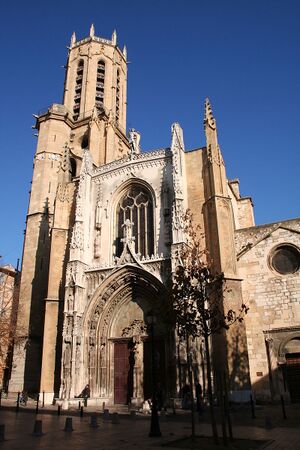Ebrarian Orthodox Catholic Church: Difference between revisions
No edit summary |
m (→Liturgy) |
||
| (18 intermediate revisions by 2 users not shown) | |||
| Line 6: | Line 6: | ||
| native_name = Ecclesia Catholic Orthodoxe Ebrarian | | native_name = Ecclesia Catholic Orthodoxe Ebrarian | ||
| native_name_lang = [[Ebrarese]] | | native_name_lang = [[Ebrarese]] | ||
| image = | | image = File:Aix-en-Provence_Cathedrale_Saint-Sauveur_1_20061227.jpg | ||
| imagewidth = | | imagewidth = | ||
| alt = | | alt = Urtedo Cathedral | ||
| caption = | | caption = Urtedo Cathedral | ||
| abbreviation = ECOE | | abbreviation = ECOE | ||
| type = | | type = | ||
| main_classification = | | main_classification = | ||
| orientation | | orientation = [[wikipedia:Eastern_Orthodox_Church|Orthodox]] | ||
| scripture = [[wikipedia:Bible|Bible]] | |||
| theology = | | theology = | ||
| polity = [https://en.wikipedia.org/wiki/Episcopal_polity Episcopal] | | polity = [https://en.wikipedia.org/wiki/Episcopal_polity Episcopal] | ||
| Line 21: | Line 21: | ||
| leader_title = | | leader_title = | ||
| leader_name = | | leader_name = | ||
| leader_title1 = | | leader_title1 = Primate | ||
| leader_name1 = | | leader_name1 = John Pius</br>Metropolitan of Urtedo, Archbishop of All Ebrary | ||
| leader_title2 = | | leader_title2 = | ||
| leader_name2 = | | leader_name2 = | ||
| Line 41: | Line 41: | ||
| associations = | | associations = | ||
| area = | | area = | ||
| language = [[Ebrarese language|Ebrarese]], Fragran | | language = [[Ebrarese language|Ebrarese]], Fragran, Laimiaic | ||
| liturgy = Ebrarian | | liturgy = Ebrarian | ||
| headquarters = | | headquarters = | ||
| Line 77: | Line 77: | ||
}} | }} | ||
The '''Ebrarian Orthodox Catholic Church''', | The '''Ebrarian Orthodox Catholic Church''', abbreviated '''ECOE''' and also known simply as the '''Ebrarian Orthodox Church''', is an [[wikipedia:Autocephaly|autocephalous]] [[wikipedia:Eastern Orthodox|Orthodox]] [[Christianity (Eurth)|Christian]] church located in [[Ebrary]]. The ECOE is consists of parishes, missions, communities, monasteries and institutions in Ebrary. | ||
The ECOE was formed by the ''Eccetista'', or [[wikipedia:iconodulism|iconodulist]], faction of the [[Adherentes Antiquate]] in an amicable split from the [[Church of Ebrary]] in 1940. Due to this history, members of the ECOE are sometimes still called '''Eccetistas''' and the church is occasionally referred to as the '''Eccetist Church'''. | |||
==Theology== | |||
''Main article: [[wikipedia:Eastern_Orthodox_theology|Orthodox theology]]'' | |||
==Liturgy== | |||
''See also: [[wikipedia:Western_Rite_Orthodoxy|Western Rite Orthodoxy]]'' | |||
''See also: [[Ebrarian liturgical rites]]'' | |||
The liturgy of the ECOE is a version of the [[Ebrarian liturgical rites|Ebrarian Rite]], an adaptation of the Aroman-style liturgy used by the Orthodox Christian church in Ebrary before the [[Ebrarian Reformation]]. After the Reformation, the liturgy was informally maintained for centuries until it was codified by a council of Adherentes Antiquate scholars in the Church of Ebrary during the 18th century, which created an Orthodox-aligned form of Christian liturgy. This was codified in the [[Adherentes Antiquate|''Prayer Guide of the Old-Fashioned Adherents'']]. In 1963, the ECOE published an updated version of the liturgy which attempted to bring the liturgy of the church back in line with mainstream Orthodoxy while simultaneously preserving the Ebrarian character inherited from the liturgy of the Adherentes Antiquate. This liturgy, outlined in the "Ebrarian Orthodox Prayerbook", has continued to be used up to the current year with only minor revisions and is known as the Ebrarian Rite. Service is generally conducted in Ebrarese, but Laimiaic and Fragran are permitted in exceptional circumstances. | |||
[[Category:Ebrary]] | |||
[[Category:Religion (Eurth)]] | |||
{{Eurth}} | |||
Latest revision as of 13:09, 18 September 2022
| Ebrarian Orthodox Catholic Church | |
|---|---|
| Ecclesia Catholic Orthodoxe Ebrarian | |
 Urtedo Cathedral | |
| Abbreviation | ECOE |
| Orientation | Orthodox |
| Scripture | Bible |
| Polity | Episcopal |
| Primate | John Pius Metropolitan of Urtedo, Archbishop of All Ebrary |
| Language | Ebrarese, Fragran, Laimiaic |
| Liturgy | Ebrarian |
| Origin | 1940 |
| Separated from | Church of Ebrary |
The Ebrarian Orthodox Catholic Church, abbreviated ECOE and also known simply as the Ebrarian Orthodox Church, is an autocephalous Orthodox Christian church located in Ebrary. The ECOE is consists of parishes, missions, communities, monasteries and institutions in Ebrary.
The ECOE was formed by the Eccetista, or iconodulist, faction of the Adherentes Antiquate in an amicable split from the Church of Ebrary in 1940. Due to this history, members of the ECOE are sometimes still called Eccetistas and the church is occasionally referred to as the Eccetist Church.
Theology
Main article: Orthodox theology
Liturgy
See also: Western Rite Orthodoxy See also: Ebrarian liturgical rites
The liturgy of the ECOE is a version of the Ebrarian Rite, an adaptation of the Aroman-style liturgy used by the Orthodox Christian church in Ebrary before the Ebrarian Reformation. After the Reformation, the liturgy was informally maintained for centuries until it was codified by a council of Adherentes Antiquate scholars in the Church of Ebrary during the 18th century, which created an Orthodox-aligned form of Christian liturgy. This was codified in the Prayer Guide of the Old-Fashioned Adherents. In 1963, the ECOE published an updated version of the liturgy which attempted to bring the liturgy of the church back in line with mainstream Orthodoxy while simultaneously preserving the Ebrarian character inherited from the liturgy of the Adherentes Antiquate. This liturgy, outlined in the "Ebrarian Orthodox Prayerbook", has continued to be used up to the current year with only minor revisions and is known as the Ebrarian Rite. Service is generally conducted in Ebrarese, but Laimiaic and Fragran are permitted in exceptional circumstances.